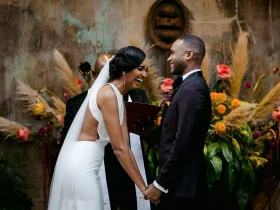Planning a wedding? I probably don’t need to tell you that the entire planning process is less than easy, especially when it comes to etiquette. If you’re the first out of your friends and family to be getting married or the world of wedding etiquette has just never crossed your mind, you’ll probably have a few questions. When do you send out the invitations? Who gets a plus one and who doesn’t? Where do you sit your parents if they’re no longer together? Well, fear not. Read on for ten top tips when it comes to wedding etiquette.
1. Address Your Invitations Correctly
Let’s start from the beginning. Those all-important invitations. The most common question asked when it comes to wedding invitation etiquette is when to send them. Traditionally, they’re sent out around 6 to 8 weeks before the big day, with saving the dates being sent around 6 to 8 months beforehand. However, those who are super organised may want to do this a little earlier – in particular, if your wedding is out of town (it goes double for a destination wedding!) or if you know any of your guests work a tricky job and will need to book time off to attend. When it comes to who to address them to, the general rule is to address it to everyone who is invited to the wedding. For example, if you don’t include children’s names on the invitation, this generally implies that the children are not invited. More on this particular issue later!
2. Clarify Your Plus Ones
Most people these days will understand that if it’s just their name on the invitation, they haven’t been given a plus one. Generally, you don’t have to allow your single guests to have a plus one, however, if most of your other guests will be in couples, it may be nice to let them bring someone if your budget allows. Of course, there are a few exceptions:
- Always invite spouses – even if you’ve never met them!
- Guests who are engaged/living together/in a long term relationship – again, even if you’ve never met their partner.
- Allow your anyone in your wedding party to bring a plus one – it’s the courteous thing to do!
3. Specify Whether Children Are Invited
Generally, this is something that you need to discuss with your partner before you make your guest list, however, getting the message across to your guests and explaining your reasons can be a little more tricky. In addition to following the advice given earlier, if you’re still worried your guests will rock up with their whole brood in tow, it can be a good idea to put a little mention on your invitations that the wedding will be adults only. Just be aware of any exceptions to this decision, such as:
- Young family members
- Relatives with young children
- Guests making a special effort (i.e. coming from overseas or out of town)
If this is the case, it’s a good idea to discuss this properly with the other guests who have been told they can’t bring their kids. If anything, just to be polite. Yes, it’s your day, and while most guests will appreciate your reasons behind the exceptions, it’s courteous just to mention it to them beforehand. Not only will they appreciate you taking the time to talk to them, but it’ll also save any awkwardness on the day! Another thing to remember is not to feel bad about your decision to have a child free wedding, most adults will be relieved to have an evening to themselves!
4. Be Polite When Asking for Money
Another common question asked when it comes to wedding etiquette is whether it’s polite to ask for money instead of gifts. Generally it’s fine, however, there are a few things to be wary of in terms of how you do it. First of all, asking for money directly on your invitation is a no go. Instead of including a gift list in your invitations, you could include a small poem or note, but specify what you’ll be using the cash for, such as your honeymoon or decorating your house. Alternatively, you could provide a list of retailers you’d like gift cards for, or even set up an online cash registry using sites like Tendr or Zola.
5. Follow Up with Those Who Haven’t RSVP’d
On every guest, there’s bound to be one or two guests who will leave it to the last minute to RSVP, if at all. It’s incredibly annoying when you’re working towards deadlines for numbers and final payments, and you still don’t have an answer by the date you specified. Information on bridal sites can be conflicting, with some saying to set a cutoff and be strict, and others saying to include them in your numbers just to be safe. Both of these, of course, have issues, with the latter potentially resulting in you paying more than what you needed to, and the former potentially resulting in the guest appearing and they have nowhere to sit. The easiest way around it is to simply keep on at them! Be strict with your deadline, but maybe leave yourself a note in the run up to follow up with anyone who hasn’t responded. If they still don’t give you an answer, leave another note for a week’s time and so on – eventually you’ll get an answer!
6. Avoid Seating Plan Drama
When it comes to the seating plan, it can be difficult to keep everybody happy. This is especially the case when it comes to divorced or remarried parents (which we’ll get to later), conflicting guests, single guests and so on. A good place to start can be to group your guests by how they know each other, such as colleagues, school friends, family and such. If there’s any conflict with certain guests, while they should know better than to cause drama at someone else’s wedding, it may just be easier to seat them apart! Finally, when it comes to your single friends, sit them with who they know. Don’t have a singles table either, as it can get awkward for all involved!
7. Look After Your Wedding Party
While it can be easy to get a little bit self-absorbed in the whole array of wedding planning, it’s important to make sure your wedding party is well looked after. We’ve spoken about letting them bring a plus one, however, this also extends to the big day itself. Make sure you spend a bit of time with them during the day and let them know you’re grateful for their help. Ensure that they’re thanked during the speeches, and it’s also customary to give them a little gift as a token of your thanks, such as a necklace for your bridesmaids or cufflinks for your best man.
8. Keep Your Folks Happy
It’s always tricky to know what to do if you have divorced or remarried parents, especially when it comes to that top table! Of course, it’s one thing if just you or your partner has divorced parents, but it can be extra confusing if it’s the same for both of you! It’s always worth having a chat with your parents to see what they would prefer. If your parents are on good terms, they may be fine about sitting at the top table without their spouse, however, make sure you consider your step-parents’ feelings about this too. You could perhaps just have a ‘sweethearts’ table for you and your partner and seat each set of parents where you feel is best, or your top table could maybe consist of you and your bridesmaids and groomsmen. What works for one family may not work for another, so the key thing is to discuss it first to avoid any nasty or uncomfortable surprises on the day!
9. Make Time for Your Guests
It sounds pretty obvious, but it’s important to make sure you speak to everyone who attends your wedding and thanks them for coming. This is why a receiving line is always a good idea, but even in this case, it can be nice to make your way around the tables after the wedding breakfast to have a chat with your guests. Of course, they’ll be well aware that you can’t sit and have a drink with every single person, but taking the time to have a quick chat is a great way to show your appreciation for them coming.
10. Send Your Thank You Notes
This is one of the most important things when it comes to wedding etiquette. As a rule, you should send them out around 2 to 3 weeks after the big day, and definitely no more than 3 months afterward. Generally, anyone who attended your wedding or sent a gift should be sent a thank you note, and you should personalise each one for the recipient. One way to keep track of everything is to note down who sent what as you open each card and gift. This will make it easier to personalise your messages, and will also stop you from getting muddled!










